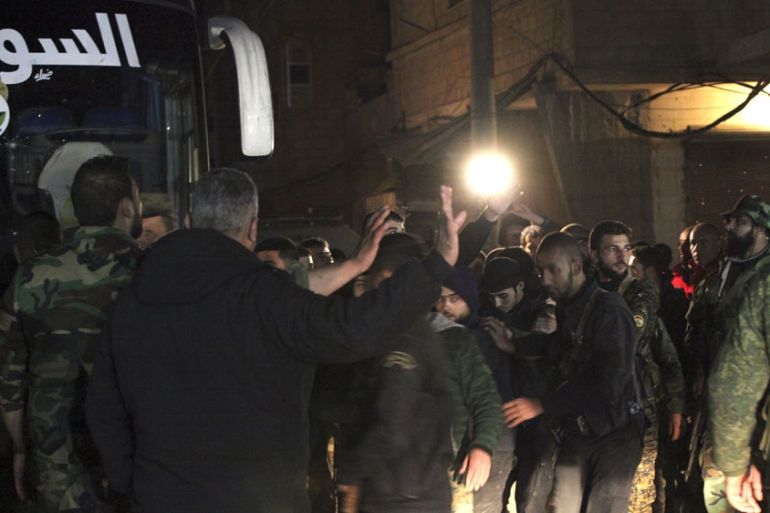Syria’s war: Surprise rebel evacuation from Eastern Ghouta
More than a dozen fighters and their families evacuated from Eastern Ghouta and brought to Idlib, state media reports.

In a surprise move, several members of Syria’s armed opposition have been evacuated from rebel-held Eastern Ghouta late on Friday, sources told Al Jazeera.
The evacuation comes as the Syrian army intensified its operations in the central part of the besieged Damascus suburb, state television reported on Saturday.
Jaish al-Islam, one of the main rebel groups in Eastern Ghouta, announced it had agreed to the evacuation of several Hay’et Tahrir al-Sham fighters – previously part of al-Qaeda-linked al-Nusra Front – who were detained by the group in Eastern Ghouta.
According to Syrian state media, 13 fighters were evacuated with their families through the al-Wafeedin passage and bussed to Idlib province.
The agreement for the evacuation was reportedly reached with the help of the United Nations and several international entities, in addition to civil society members.
The evacuation deal came after Jaish al-Islam sent a letter last month to the UN vowing to facilitate the evacuation of the former al-Qaeda members.
Split down the middle
Syrian state TV reported that the army is close to cutting the enclave in two.
The Syrian army was advancing near Mesraba and Mudeira, two small towns which represent the last link between the northern and southern halves of the enclave, which is located near to the Syrian capital, Damascus.
Jaish al-Islam and Failaq al-Rahman, another large rebel group in Eastern Ghouta, said they have staged counter-attacks in recent days that retook some lost positions.
The ferocious three-week assault on the last major rebel stronghold near Damascus has captured about half its area and killed 960 people, according to a war monitor.
The Britain-based Syrian Observatory for Human Rights also said on Saturday that warplanes, helicopters and artillery were used in bombardment of the area overnight.
Syrian President Bashar al-Assad and Russia, his main ally, say the campaign is needed to end rebel shelling of Damascus and to end the rule of rebels over the area’s civilians.
The offensive follows the pattern of previous assaults on rebel strongholds, deploying massive air power and tight sieges to force rebels to accept “evacuation” deals.
These involve rebels surrendering territory in exchange for safe passage to opposition areas in northwest Syria, along with their families and other civilians who do not want to come back under Assad’s rule.
However, both Jaish al-Islam and Failaq al-Rahman have said they are not negotiating such deals for themselves.
Shortages
The intensity of the government’s attack on an enclave that has been besieged since 2013 and suffers acute shortages of food and medical supplies has drawn Western condemnation and demands by UN aid agencies for a humanitarian halt in fighting.
The United Nations estimates that some 400,000 people are trapped in the enclave.
“Living conditions are harsh … Shop owners and traders are sending their workers to the shelters to sell food for three times their price before the offensive,” said a man in Saqba who identified himself as Abu Abdo in a voice message.
Aid agencies have tried to deliver aid into Eastern Ghouta, but they have only been able to bring in a portion of the amount they wanted.
A convoy was unable to finish unloading on Monday because of continued fighting, bringing in the remaining undelivered food parcels on Friday despite bombardment nearby.
However, UN agencies said most medical supplies had been stripped from the convoy by Syrian government officials and added that the food supplies brought in were insufficient.
The government has opened what it says are several safe routes out of Eastern Ghouta for civilians, but none are known to have left so far and Damascus and Moscow accuse the rebels of preventing them from fleeing the fighting.
